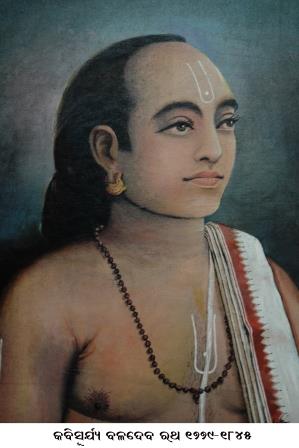Born :- 17th Century
Died :- 18th Century
Place of Birth :- Bada Khemundi Gada, Ganjam

Kabisurjya Baladeba Ratha, eminent composer and musician of Odissi music, famous for his champu, chaupadi, chautisa, devotional songs and social satires of high standards was born to Kabiraja Brahma Ujjwala Ratha of the erstwhile Badakhemundi (now Digapahandi) in Ganjam district in the year 1789. A prominent poet of the Riti era of Odia literature, he wrote in both Sanskrit and Odia and created new zeal among the people with his mellifluous devotional songs and social satires.
Baladeba Ratha's mother died when he was ten years old and he was brought up by his maternal grand father, Tripurari Hota in Athagada, who also taught him Sanskrit and Odia literature. Under his watchful guidance Baladeba had mastered grammar and Sanskrit lexicons, studied and duly appropriated ancient scriptures besides all contemporary literature and learnt all tenets of Odissi music. Before he married at the age of 15, Baladeba had already created ripples with his songs based on the eternal love between Radha and Krishna, the divine consort. Following his father's death, he moved to the eighbouring Jalantara state where prince Rama Chandra Chhotaraya was highly impressed with his unique literary talent. He encouraged the poet and conferred on him the 'Kabisurjya' title.
Kabisuyra was a scholar of Odissi music and had composed poems in devotion to Lord Vishnu. He was associated with a group of poets, which included Dinakrushna Dasa and Abhimanyu Samantasinghara. His best-known works are contained in the compilations, Kabisurjya Granthavali, Kabisurjya Geetabali. Kisora Chandrananda Champu which is unequivocally acclaimed as his masterpiece, the Ratnakara Champu and the Premodaya Champu, hundreds of devotional songs, chaupadis and chautisas were written in the tradition of Odissi music, employing traditional ragas and talas unique to Odissi. Besides, he wrote famous satires like Jagate kebala jane hasibe…, unique devotional songs like Sarpa janana and prose like Hasya Kallola.
Baladeba Ratha is credited as originator of the Dhumpa Sangita. He is said to have invented the dhumpa, a bamboo percussion instrument that accompanies the Odia folk art form of dhumpa sangita. The dhumpa accompanies recitations of his songs called dhumpa geeta. Much later, the second man after Baladeba Ratha to have written dhumpa songs was Gadadhar Singh Samanta, son of the illustrious Pathani Samanta of Khandapada gad in Nayagad district.
The poet is said to have died of cholera in Athgad in the year 1845. The erstwhile Boirani in Ganjam district was named as Kabisuryanagar in honour of his memory.
